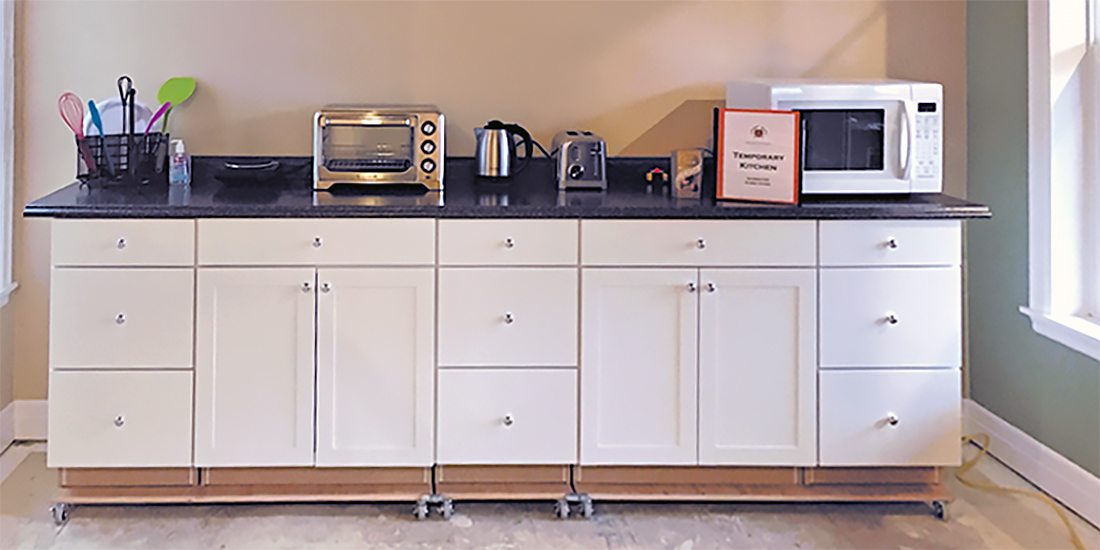 The TempKi is a combination of cabinets on casters, a pre-formed counter, power strips, and appliances.
The TempKi is a combination of cabinets on casters, a pre-formed counter, power strips, and appliances.
Q: If we decide to commit to a kitchen remodel, how will we cook our meals during the construction period of the project?
A: You will certainly lose kitchen functionality as you’ve known it once construction begins.
If you’ve ever endured a large-scale remodel, even one with great results, you probably remember the most agonizing aspects of that experience. If you haven’t, pursuing a remodel can be still be intimidating because there are so many decisions to be made and so many factors, from budget to schedule, that affect the project.
People often overlook the fact that from the very the first step—the demolition phase—you immediately lose functional amenities. Often preparing meals means cooking outside (a difficult proposition in the Pacific Northwest) or ordering food in. Meal costs add up and diets suffer. Dishes and appliances become inaccessible. Simple tasks like pouring a drink of water or toasting bread are almost impossible.
But there is a way to keep your house running smoothly during a kitchen remodel.
Home Run Solutions co-owner Jacob Thompson recalls a recent discussion he had with a family of five in Snohomish before their much-anticipated remodel. “They expressed concern about losing the function of their kitchen for the entire duration of the remodel. We put ourselves in their shoes and realized we could do better. There was no reason that small appliances, cabinets and counter space had to be completely eliminated during the remodel.”
And so, the concept of the temporary kitchen—dubbed “TempKi” by Thompson—was born.
For this project, Home Run Solutions procured a set of stock cabinets and fitted them with casters for easy mobility. Any combination of the four cabinets can be reconfigured and reused for future projects. Next, they added a molded countertop and adequate power strips. They added select kitchen appliances such as a toaster oven, crock pot, coffee maker, and microwave, plus some basic utensils, towels, and cutlery. The temporary kitchen could be immediately rolled out for use on day one of the demolition.
Thompson says: “Once we started planning the TempKi, we had numerous ideas, which I’m sure will be integrated into setups in the future. It all depends on the homeowner’s needs and the availability of utilities that will remain in place during the remodel.”
The refrigerator, for example, often stays onsite during the renovation. If it has wheels, the remodeling crew can move it out of the way as construction begins so your family can continue to use it. If the project includes a new fridge, the old one can be temporarily replaced with a mini fridge. Home Run Solutions offers one to clients for use during projects. They plan on offering similar appliance solutions for some bathroom remodels and whole-house additions in the future.
Every remodel is unique and certain limitations and challenges will emerge once it begins. If you or your remodeler can anticipate your needs in advance, you can make the necessary temporary kitchen accommodations to ease the process.
No one should have to remodel their lives when they remodel their kitchen.
Joe Reed is co-owner of Home Run Solutions, a member of the Master Builders Association of King and Snohomish Counties (MBAKS). If you have a home improvement, remodeling, or residential homebuilding question you’d like answered by one of MBAKS’ more than 2,900 members, write to homework@mbaks.com.